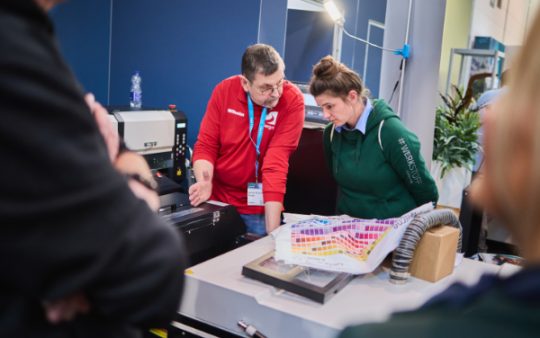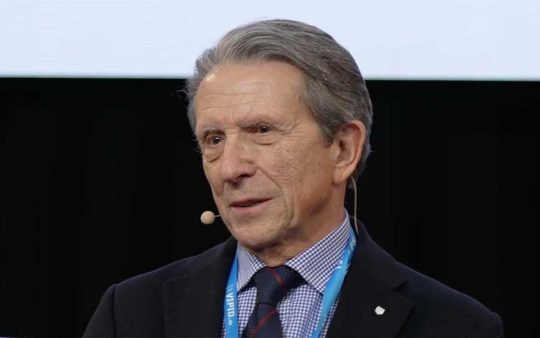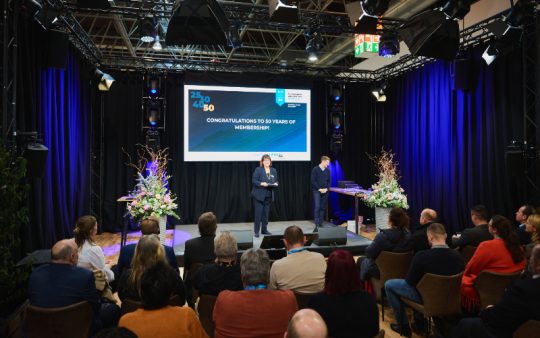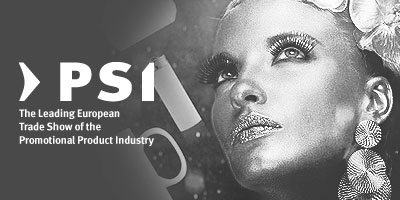Transformation without resistance? Astrid Schulte relies on patience and trust

Published on 04.08.2024
We spoke to Berendsohn Werbeartikel CEO Astrid Schulte about transforming both the company and her personal life, about clichés surrounding parental duties and self-efficacy instead of a victim mentality.
Can you share some insights into your work as a female CEO?
Astrid Schulte: „First and foremost, I am a CEO, and then I am also a woman. I certainly have a leadership style that is more often attributed to women, but which many men now also have. I think it’s important not to follow role or gender clichés, but to develop exactly the management style that suits me, the team and the company. As CEO, I have the task of serving the company and leading employees in such a way that the company is economically successful and people give their best. In my experience, however, they only do this if they are recognised and supported and if the framework conditions are right. It’s not about me, I don’t have to be anyone or represent anything. Above all, it’s about the people in our company.“
How important is it for you as CEO to be physically working in the company?
Astrid Schulte: „My position allows me to shape things effectively, which is exactly what I want. I see my role as developing people and setting an example myself. As CEO, I have a central role to play in a transformation in particular: I have to inspire each and every individual to embrace change, always have the big goal in mind, clearly communicate expectations and results and keep my nerve and confidence, even when there are sometimes setbacks. And I have to lead the way as a role model. If I don’t believe in what we are doing and want to achieve, the employees won’t believe in it either. It is often said that as a CEO you should only work ‘on’ the company, but often it is also necessary to work ‘in’ the company. Depending on the situation, both are essential, especially in companies of our size.“
How should we imagine your daily routine in the company?
Astrid Schulte: „I make the strategic decisions in the company with a small steering committee. The strategy has been in place since 2017, but is constantly being adapted slightly as conditions change. This strategy is divided into sub-strategies for each division. This ensures that all activities in the company move in the same direction and follow the same strategy. We use the OKR concept (Objectives and Key Results) to track the achievement of objectives and measures. I meet the managers of the individual areas every week to have sparring sessions and discuss interim results. I also manage international sales myself, of course in collaboration with managers. Sales is the centrepiece of our company and I believe that management is therefore a matter for the Executive Board. I see many of our sales employees on a regular basis because sales works through proximity and closeness. It’s important to me to be physically present and meet people directly. After Covid, where everything was run only via teams, I realised that physical togetherness is irreplaceable. Our direct sales organisation was hit hard by the crisis. Now I see most of the employees about twice a year and the managers almost every month. I regularly travel to our company’s largest markets, Germany, Italy and Austria, to understand what moves people there.“
How important is your personal contact with employees?
Astrid Schulte: „Proximity is crucial. Our transformation would not have been possible without our employees’ fundamental trust in me. As CEO, I am visible and explain the principles of my leadership and our strategy on a large and small scale. I give employees the time they need to adapt. It’s about shaping the transformation in a sustainable and future-proof way, not with a crowbar, but with patience and trust.“
How has your perspective changed and how does this affect your leadership behaviour?
Astrid Schulte: „I have learnt how fundamental coherence is in my own life. Coherence is the state in which personal, family and professional life fit together, where thinking, feeling and acting are in harmony. For me, it is fundamental that my professional environment suits me and my life, my goals, my values and my ideas of fulfilment. I also want to enable this coherence for the people in our company. To achieve this, I have to create the right framework conditions with my team. Close and individualised leadership is important to me. Everyone needs and wants individualised leadership. We have to adapt to different groups of employees and their requirements and understand how we can meet them so that people are able and willing to give their best. This is particularly important for companies undergoing transformation, whose challenges and perspectives are constantly changing. We can provide support and create framework conditions, but the willingness to transform must come from each individual – every day anew.“
Is transformation your way of life?
Astrid Schulte: „My personal journey has always been characterised by change. Transformation is not a one-off event, but usually a continuous process. It’s the same in business: after a transformation, not everything is great for the next ten years. There are always shifts in perspective, new ways of understanding things and people. I try to encourage my employees to see change as something positive, and many of them do. I myself am characterised by curiosity. In my life, change has almost always been a change to something better, so the word transformation has a very positive connotation for me.“
What role does one’s personal values play in career planning?
Astrid Schulte: „I didn’t realise the importance of values before, I often made decisions based on external criteria or my gut feeling. After my corporate career, I once took part in an intensive values coaching programme. That was a real game changer for me. It resulted in five values that are non-negotiable for my personal, family and professional life. These values are now my framework for making decisions. For example, freedom and self-determination are important values for me. I have also turned down great jobs in corporations based on external criteria because they would not have given me the creative freedom and freedom that is important to me. I am an entrepreneur through and through, I have clearly recognised that. Once I had defined my five values, in retrospect I was also able to understand why people or even professional stations had done me good or not done me good in the past.“
How do these values influence your leadership at Berendsohn?
Astrid Schulte: „Before we made the decision to work together, I spoke to the owning family about values and the cornerstones of our collaboration. Before we made the decision, we also defined the rules that would apply in our future together. When I started at Berendsohn, I also made my values clear to my employees. In one-to-one meetings (100 meetings in the first 100 days), I also encouraged my employees to do the same. That really helped me to understand the people in the company. My values help me every day to make conscious decisions and shape my work.“
Do you have any advice for parents who have career ambitions?
Astrid Schulte: „Firstly, you are more effective than you think. Many people believe that parental duties are a problem, but that’s a total misconception. There are many reasons why you can sometimes work more and sometimes less – be it a sick mother or a personal dream that you want to realise. An employer should adapt to this. Secondly, flexible working hours can be very helpful. We have employees who adjust their working hours depending on their life situation. For example, we have a mum who sometimes works full-time and then part-time again, depending on her needs. Thirdly, you should not hesitate to make your own suggestions. Most employers are more open to flexible solutions than you might think.
The important thing is that as parents we don’t always have to do everything perfectly. I also fell into this trap at the beginning. It’s better to accept that not everything works in every situation; it’s not a bad thing if I can’t be in the office at 9am in a great career position, have lunch with my children and squeeze in a yoga session in the afternoon at the same time. We shouldn’t put too much pressure on ourselves and should enjoy life more.“














